
Schindleria is a genus of marine fish. It was the only genus of family Schindleriidae, among the Gobioidei of order Perciformes but is now classified under the Gobiidae in the Gobiiformes. The type species is S. praematura, Schindler's fish. The Schindleria species are known generically as Schindler's fishes after German zoologist Otto Schindler (1906–1959), or infantfishes. They are native to the southern Pacific Ocean, from the South China Sea to the Great Barrier Reef off eastern Australia, and Rapa Nui.
Victor Gruschka Springer was an American biologist who was a Senior Scientist emeritus, Division of Fishes at the Smithsonian Institution's National Museum of Natural History in Washington, D.C. He was a specialist in the anatomy, classification, and distribution of fishes, with a special interest in tropical marine shorefishes. He published numerous scientific studies on these subjects; also, a popular book called "Sharks in Question, the Smithsonian Answer Book" 1989.

The foxface rabbitfish, also known as the foxface, black-face rabbit fish, badger fish or the common foxface is a species of marine ray-finned fish, a rabbitfish belonging to the family Siganidae. It is found in the Indian and Pacific Oceans. It can be found in the aquarium trade.

Bodianus or the hogfishes is a genus of fish in the family Labridae found in the Atlantic, Indian and Pacific Ocean. These species have many parasites.

Plectorhinchus chaetodonoides, the harlequin sweetlips, clown sweetlips, spotted sweetlips or many-spotted sweetlips, is a species of marine ray-finned fish, a sweetlips belonging to the subfamily Plectorhinchinae, one of two subfamilies in the family Haemulidae, the grunts. It is native to the Indo-Pacific region. This species is of minor importance to local commercial fisheries and can be found in the aquarium trade.

Genicanthus semifasciatus, the Japanese swallow, is a species of marine ray-finned fish, a marine angelfish, belonging to the family Pomacanthidae. It is found in the Western Pacific.

Paracentropyge multifasciata, the barred angelfish, banded pygmy-angelfish, many-banded angelfish, multi-banded angelfish or multibarred angelfish, is a species of marine ray-finned fish, a marine angelfish, belonging to the family Pomacanthidae. It is native to the Indo-Pacific.
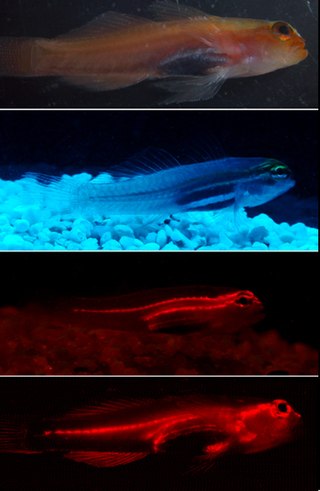
Eviota pellucida, commonly called neon pygmy goby or pellucida pygmy goby, is a species of marine fish in the family Gobiidae.
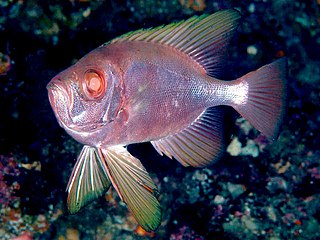
Cookeolus japonicus is a species of fish in the family Priacanthidae, the bigeyes and catalufas. It is the only extant species of Cookeolus, except for C. spinolacrymatus, an extinct Late Pliocene fish known from a fossil specimen collected in Okinawa, Japan.

Branchiostegus is a genus of marine ray-finned fishes, tilefishes, belonging to the family Malacanthidae. They are found in the eastern Atlantic Ocean through the Indian Ocean to the western Pacific Ocean. Here they create burrows in soft substrates in the comparatively deep waters of the continental shelf and slope.
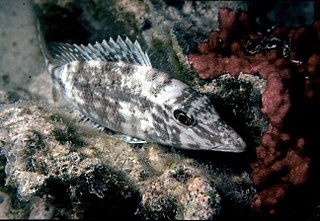
Lethrinus microdon, the smalltooth emperor, longface emperor or pigface bream, is a species of marine ray-finned fish belonging to the family Lethrinidae, the emperors and emperor breams. This species has a widespread distribution in the Indo-Pacific.
Trimma tevegae, commonly known as the bluestripe pygmygoby or blue-striped cave goby among other names, is a species of goby from the western Pacific. They are small fish, averaging at 2 cm (0.79 in), orange-brown with white undersides in life, with characteristic iridescent blue or lavender stripes on the sides and on top of the body. They are usually found in large schools in the sloping or vertical drop-offs at coral reef edges. They are sometimes caught for the aquarium trade, and are also known by hobbyists under the name blue line flagtail goby. The species is named in honor of the schooner Te Vega.
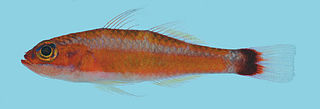
Trimma caudomaculatum, the blotch-tailed pygmygoby , is a species of goby from the Western Pacific. Like other members of the genus, they are usually found in large schools in the sloping or vertical drop-offs at coral reef edges. Similar to other species of Trimma this species consists of multiple cases of bidirectional sex change, meaning that if a group is lacking in a specific sex a partial amount of the group can change their undeveloped gonad structure of the opposite sex in order to accommodate. This sex change is made possible due to the females having a developed set of ovaries with female hormones that are developed, and a set of testis and male hormones that are underdeveloped; The males follow a similar set up in vice versa, so their testis and male hormones are developed, while the ovaries and female hormones are underdeveloped.

Abalistes filamentosus, the hairfin triggerfish, is a species of marine ray-finned fish belonging to the family Balistidae, the triggerfishes. It is found in the Indo-Pacific Ocean and in subtropical waters. It lives in the Pelagic-Neritic zone of the ocean between 61–180 meters deep. It is harmless to humans.
Acanthopagrus akazakii is a species of marine ray-finned fish belonging to the family Sparidae, the sea breams and porgies. This species is found in the Western Pacific Ocean around New Caledonia.
Arothron multilineatus, the multilined pufferfish, is a species of ray-finned fish in the family Tetraodontidae. It is an uncommon fish and is known only from four specimens from Pagbilao in the Philippines, although photographs of individuals in the Ryukyu Islands, Mozambique and the Red Sea show that it has a wide distribution. It was first described by the Japanese ichthyologist Keiichi Matsuura in 2016.

Cookeolus is a genus of marine ray-finned fishes from the family Priacanthidae, the bigeyes. It contains one extant species and one extinct species.
Branchiostegus okinawaensis is a species of marine ray-finned fish, a tilefish belonging to the family Malacanthidae. It is found in Okinawa.
Inegocia japonica, the Japanese flathead, rusty flathead or smooth flathead, is a species of marine ray-finned fish belonging to the family Platycephalidae, the flatheads. It is found in the Indo-West Pacific region.
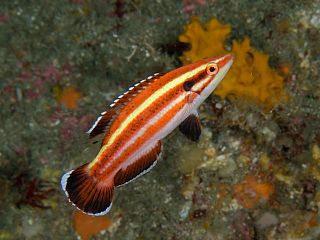
Bodianus masudai is a species of wrasse. It is found in the western Pacific Ocean.












